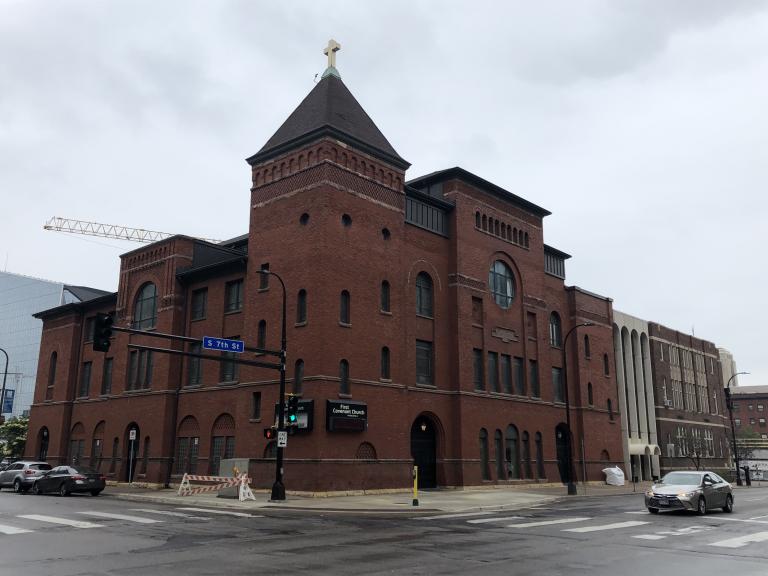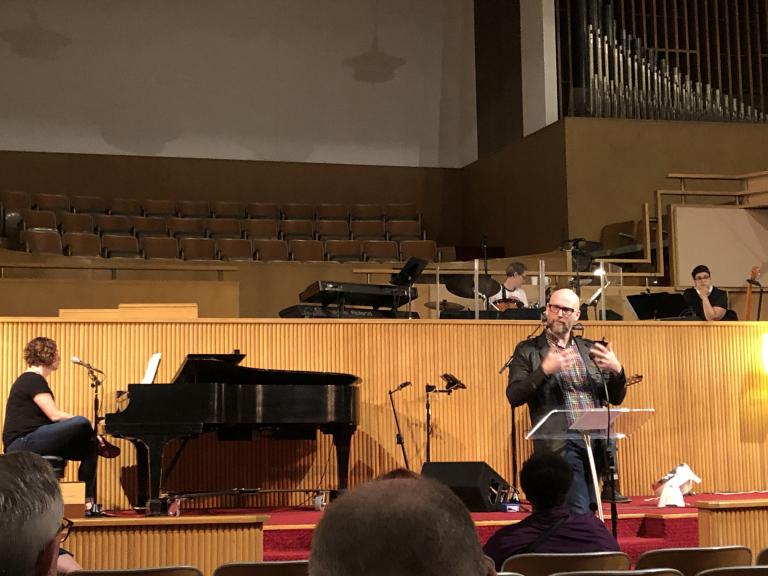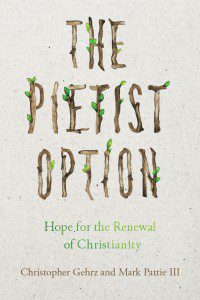To this point it’s primarily been mainline denominations like the United Methodist Church and Anabaptist groups like the Mennonite Church USA that have faced schism over sexuality and same-sex marriage, what religion journalist Richard Ostling calls “Protestants’ most divisive issues since slavery.” But evangelicals’ turn is fast approaching. Last week the 2019 synod of the Christian Reformed Church in North America debated the interim report of a committee tasked “to explore biblical conceptions of sexuality and gender,” with a final vote looming in 2021. And this week my home denomination will vote on expelling one of its oldest, now LGBT-affirming congregations.
The Evangelical Covenant Church (ECC) was founded by pietistic Swedish immigrants in 1885, eleven years after First Covenant Church Minneapolis (FCCM) was organized. At the 2019 Annual Meeting in Omaha, delegates will consider a recommendation that FCCM be “involuntarily dismissed” for being “out of harmony” with the ECC’s position on human sexuality. It would be the first such excommunication in Covenant history, but likely not the last over an issue that increasingly divides a denomination renowned for seeking unity in essentials and granting liberty in all other matters.
Though one of the fastest-growing religious groups in the United States, the Covenant Church is still relatively small. So what follows is my attempt to interpret the ECC’s version of the sexuality debate for a wider evangelical audience, in light of a Pietist heritage that is one of the oldest sources of historic evangelicalism and yet also makes the Covenant somewhat unusual in contemporary evangelicalism.

In 1996, the year the U.S. Congress passed the Defense of Marriage Act with bipartisan support, ECC Annual Meeting delegates adopted a resolution affirming that “publicly declared, legally binding marriage between one woman and one man is the one appropriate place for sexual intercourse. Heterosexual marriage, faithfulness within marriage, abstinence outside of marriage—these constitute the Christian standard.” Since then this formula has been reiterated often, but such resolutions typically have no binding force. For example, the ECC statement on the environment is four years older than the one on sexuality, yet I’ve never heard of any Covenanter being sanctioned because he or she failed to “examine his or her personal environmental stewardship” nor any congregation being ruled “out of harmony” for not heeding the Annual Meeting’s exhortation to “to teach environmental awareness from a Christian perspective.”
But for whatever reason, sexuality has been treated differently by Covenant leadership. In February 2015, the ECC terminated its partnership with Christ Church, a new congregation in Portland, Oregon, over its pastor’s affirmation of same-sex marriage and the full participation of LGBT Christians in the life of that faith community. Later that year, the Covenant released a set of guidelines requiring clergy to uphold the denominational stance on sexuality (whatever their personal belief) and not to officiate same-sex weddings. When Covenant pastor Judy Peterson violated the latter provision, she was removed from her position as campus pastor at North Park University, the denomination’s school in Chicago.
Peterson preached this past Sunday at First Covenant Minneapolis, which last year affirmed its desire to “Welcome all persons and families, including LGBTQ+, to participate at all levels of community” (including congregational leadership roles) and to offer pastoral care (including weddings) to “all in our congregation without regard for ability, race, sex, gender identity or sexual orientation.” As a result, lead pastor Dan Collison had his credentials suspended, and the congregation was notified that it was “out of harmony” with the denomination’s position.
The fact that this is the first Covenant congregation to face involuntary dismissal is particularly notable. FCCM is one of the oldest churches in the denomination, and perhaps the most prominent, with its historic brick building standing across from the Vikings stadium in downtown Minneapolis. Its most famous pastor was E.A. Skogsbergh, the “Swedish Moody,” and one of his successors, Paul Rees, was a leader of the National Association of Evangelicals and World Vision — and one of the signers of the 1973 Chicago Declaration of Evangelical Social Concern. Its scholar-in-residence is Jay Phelan, the retired president of North Park Theological Seminary, and its membership includes Phil Anderson, the Oxford-educated dean of Covenant historians. After a period of decline, FCCM has rebounded under Collison, and would normally be celebrated by the Covenant as a model of church revitalization and socially conscious urban ministry.

Now, First Covenant hasn’t been dismissed yet. In the denomination’s polity, the Annual Meeting is the governing body, not the executive board. In an extraordinary public post, former ECC president Glenn Palmberg reminded delegates that “it is not inappropriate or disloyal or unCovenant to vote in opposition to a recommendation from the Covenant Executive Board.” (He even reported that one-third of that committee itself voted against dismissing First Covenant.) Palmberg warned that involuntary dismissal “would mean the people who constitute the FCCM congregation are removed from the ECC by vote of their fellow Covenanters. This dismissal would include people who have found new life in Christ during the revitalization of this historic church.”
So above all, I pray that God would grant wisdom to this year’s delegates, who are under enormous pressure. For Covenanters on both sides of the debate, what’s at stake is the very identity of an increasingly diverse denomination that describes itself as “Evangelical, but not exclusive; Biblical, but not doctrinaire; Traditional, but not rigid; and Congregational, but not independent.” In a May 31 email to Covenanters, ECC president John Wenrich warned that “the future of our denomination rests on the discernment of this Annual Meeting,” with the decision bearing “implications not merely upon our theology or ministry, but upon our identity.”
I think he’s right, but not for the reasons he states. Covenanters can agree with the “discerned position” on human sexuality and yet still desire unity with those “mission friends” (the original name for Covenanters) who disagree. For those of us, FCCM’s dissent on a non-essential matter is a non-threat for a non-confessional church. (That’s a key distinction between the ECC and denominations like the Christian Reformed Church, where the debate is not whether to grant certain beliefs “confessional status,” but if the traditional position on sexuality warrants that standing.) As Anderson explained in his response to the “out of harmony” recommendation, the Covenant Church was “born of ‘dissent’… the Covenant story, therefore, is one of ecclesial liberation that could empower cohesive diversity because it was rooted solely in the personal experience of new life in Christ.”
Seen from that vantage point, the real threat to Covenant identity would be to abandon the very heritage that makes the ECC both historically evangelical and distinct from other contemporary evangelical bodies: Pietism.
 I’m sure it’s no secret that the Covenant’s internal debate about sexuality was never far from my mind as I co-wrote The Pietist Option two years ago. That was especially true of ch. 6, in which I argued that part of “the Pietist option is to insist that unity—while impossible to achieve perfectly—is essential to Christian community, mission, and witness.” (“Grant us grace,” Collison prayed for all Covenanters on Sunday morning, “that a watching world might see Jesus in the midst of disagreement.”) Indeed, it was because I recognized Pietism’s “irenic spirit” in the life and ministry of the Covenant that I rejoined the denomination of my upbringing when I moved back to Minnesota in 2003.
I’m sure it’s no secret that the Covenant’s internal debate about sexuality was never far from my mind as I co-wrote The Pietist Option two years ago. That was especially true of ch. 6, in which I argued that part of “the Pietist option is to insist that unity—while impossible to achieve perfectly—is essential to Christian community, mission, and witness.” (“Grant us grace,” Collison prayed for all Covenanters on Sunday morning, “that a watching world might see Jesus in the midst of disagreement.”) Indeed, it was because I recognized Pietism’s “irenic spirit” in the life and ministry of the Covenant that I rejoined the denomination of my upbringing when I moved back to Minnesota in 2003.
Having lived through splits in Baptist churches in Virginia and Connecticut, I “gained new appreciation that the Covenant Church holds only five broad doctrinal affirmations” — none of which addresses sexual ethics — “plus a sixth that grants ‘freedom in Christ’” on all other matters on which fellow believers tend to disagree. For example, the Covenant affirms both infant and believer’s baptism — and even requires pastors to be willing to perform either. (Not that congregations that fail to advertise this fact and baptize in only one mode have ever been declared “out of harmony.”)
Or consider Christian participation in warfare… In a recent article on the Covenant understanding of freedom in Christ, North Park professor Michelle Clifton-Soderstrom pointed out that the ECC has also affirmed contradictory positions on this ancient debate. “Just war Christians and pacifist Christians remain at irreconcilable odds when it comes to the permissibility of killing,” but Covenanters of both convictions have granted freedom to each other. “That it has also shown hospitality to just war adherents and pacifists,” concluded Clifton-Soderstrom, “deeming both disciples of Jesus Christ in equal measure, demonstrates humility in the face of deep and complex moral questions.” If that’s possible with baptism and warfare, her readers might wonder, why not sexuality?
That pietistic ethos of mutual hospitality and humble conviction has often led Covenanters to talk about unity using that word harmony, which Anderson defined in terms of another classic emphasis of Pietism:
Harmony always referred to living faith as the sole criterion of belonging: mission, mutual support of the denomination’s ministries, but never doctrine beyond the ancient creeds of the Church (especially the Apostles’ Creed) or positions where Christians may have serious differences.
For those of us who cherish this aspect of the Pietist/Covenant heritage, it is creating new criteria for belonging that puts us out of harmony with each other, not the lived faith of FCCM’s pastors and members.
Of course, Wenrich would strongly disagree with me. “To make this conversation about pietism,” he wrote in late May, “is a distraction away from the true issues at hand. And if we allow this distraction to become the centerpiece of conversation, we give validity and credence to the subversive actions of FCCM; actions that have never represented the ways in which we have behaved together as a Covenant, even in disagreement and dissent.” In a subsequent video, he apologized for failing to “communicate the depth of my sorrow” and insisted that “I am so proud of our Pietist heritage as Mission Friends.” But Wenrich continued to argue for FCCM’s dismissal, insisting that “False unity does not last, as other denominations have discovered.”
“The Covenant is about freedom,” Wenrich wrote in the May 31 email, “but I believe the authority of Scripture is even more core to Covenant identity.” Indeed, the first Covenant Affirmation is “the centrality of the word of God,” and all prospective members of Covenant congregations are asked whether they “accept the Holy Scriptures, the Old and New Testaments, as the word of God and the only perfect rule for faith, doctrine, and conduct.” (The only other membership question is, “Do you confess Jesus Christ as your Savior and promise to follow him as Lord?”)

But to set biblical authority over and against Christian freedom betrays a misunderstanding of how Pietism has shaped these evangelicals’ understanding of the Bible. The ECC’s official explanation of its first affirmation starts with Pietist forebear Philipp Jakob Spener, who had recovered
the living nature of the word of God. The word is the “powerful means” to the creation of new life through the Holy Spirit. For many in Spener’s day the word of God was simply information, or law, or rules; for Spener the word was power—power to effect change in the life of the hearer through the Holy Spirit.
Rejecting fundamentalist readings of Scripture in a 1963 report on “Biblical Authority and Christian Freedom,” a denominational committee that included FCCM pastor Paul Fryhling credited our Pietist forebears with a “rediscovery of the living view of the Bible which characterized the early Reformation,” a view forgotten by established churches that were “rigidly orthodox” but “often did little to meet the needs of the heart and made difficult a warm-hearted and vital relation to the message of Scripture.” A proper reading of the Bible, Fryhling et al. concluded, would “find it an altar where one meets the living God and receives personally the reality of redemption.”
Moreover, they acknowledged that “the meaning of the Bible or the nature of its relevance is not so clear as to remove all diversities of interpretation.” No doubt thinking of the Covenant’s own origins as a renewal movement within a Lutheran state church, the committee even admitted that “Christian vitality has not always been maintained by the majority. It has, in fact, often been found only in small minorities.”
(This view itself is deeply rooted in Pietism. In his pioneering work of church history, the Pietist scholar Gottfried Arnold found the Anabaptists and other persecuted dissenters more Christ-like than the magisterial churches that had condemned them as heretics. Arnold refused “to demean the virtues of those who would normally be described as enemies. I have always wished from the heart that love would set a sweet harmony and peace to my disposition during this work, so that all emotions would be kept in the best possible balance and all the requisites of a just, true history may be provided.” I can only hope that I’ve accomplished something similar with this review.)
None of that means that FCCM’s reading of what the Bible says on love and marriage is necessarily right. But it strongly suggests that those of us in the majority should hesitate to label ours the “biblical” position and imply that the minority have rejected the authority of Scripture. We must be willing to grant that legitimate dissent can result from encountering the living God in his written word.
Indeed, it’s an old Covenant maxim that it’s the Old and New Testaments themselves that form the “only perfect rule” — not any particular interpretation of them, however popular or traditional. At the conclusion of his post urging a No vote on FCCM’s dismissal, Glenn Palmberg quoted from the ECC’s 2010 resource paper on reading the Bible:
Regardless of the reason, the record of misreadings in Christian history is cause for humility in our own reading of the Bible. It should cause us to pause before we make authoritative statements about a particular interpretation of a passage—especially if it is an interpretation on which Christians authentically disagree. Simply put: we sometimes get it wrong. When reading faithfully, we will often find the Bible challenging the way we live rather than affirming it. The Bible pierces to the depths of our souls and “judges the thoughts and attitudes of the heart” (Hebrews 4:12).
I don’t expect that most evangelical readers will affirm FCCM’s position on same-sex marriage and LGBT participation in church leadership. But I do hope they see that the issues here are complicated — and that seeking answers in Scripture should leave us feeling challenged at least as often as we feel affirmed. Moreover, what’s happening this week in the Covenant Church should remind all evangelicals that debate over Christian unity in light of honest differences over sexuality and marriage cannot be avoided by any evangelical body — at least, not unless it’s willing simply to write off a generation of younger evangelicals who increasingly take a different view of these matters than their parents and grandparents.
Update: on Friday about 75% of delegates to the ECC Annual Meeting voted to expel FCCM; later that afternoon, they voted to strip Collison of his credentials. (Steve Armfield, a retired Covenant pastor who had officiated his son’s wedding to another man, was also removed from the roster.)













